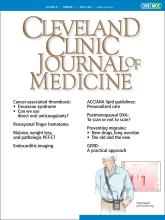ABSTRACT
Gastroesophageal reflux disease (GERD) is mainly a clinical diagnosis based on typical symptoms of heartburn and acid regurgitation. Current guidelines indicate that patients with typical symptoms should first try a proton pump inhibitor (PPI). If reflux symptoms persist after 8 weeks on a PPI, endoscopy of the esophagus is recommended, with biopsies taken to rule out eosinophilic esophagitis. This review discusses the evidence for different medical, endoscopic, and surgical therapies and presents a management algorithm.
- Copyright © 2020 The Cleveland Clinic Foundation. All Rights Reserved.
- Prashanthi N. Thota, MD, FACG⇑
- Medical Director, Esophageal Center, Digestive Disease and Surgery Institute, Cleveland Clinic
- Clinical Assistant Professor, Cleveland Clinic Lerner College of Medicine of Case Western Reserve University, Cleveland, OH
- ADDRESS:
Prashanthi N. Thota, MD, FACG, Esophageal Center, Digestive Disease and Surgery Institute, A31, Cleveland Clinic, 9500 Euclid Avenue, Cleveland, OH 44195; thotap{at}ccf.org
ABSTRACT
Gastroesophageal reflux disease (GERD) is mainly a clinical diagnosis based on typical symptoms of heartburn and acid regurgitation. Current guidelines indicate that patients with typical symptoms should first try a proton pump inhibitor (PPI). If reflux symptoms persist after 8 weeks on a PPI, endoscopy of the esophagus is recommended, with biopsies taken to rule out eosinophilic esophagitis. This review discusses the evidence for different medical, endoscopic, and surgical therapies and presents a management algorithm.
- Copyright © 2020 The Cleveland Clinic Foundation. All Rights Reserved.






